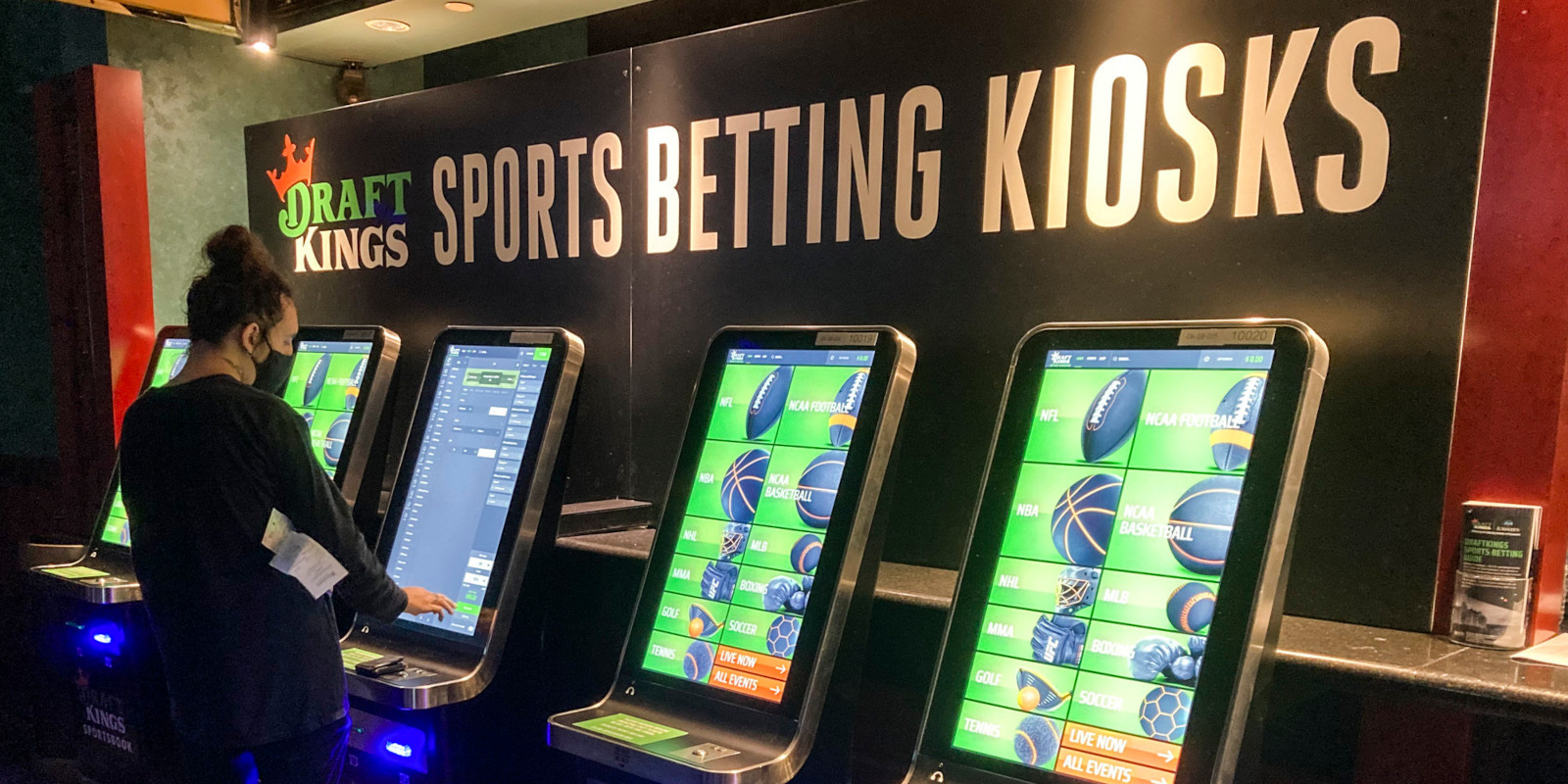Any sports fan can tell you that something has changed in the world of sports-betting. The laws are changing, the leagues are partnering with betting sites and some of our favourite athletes are riding the gravy train. In this three-part series, journalist Mark Hill digs into what it means for fans, governments and people who struggle with addiction. Part one covers the changing fan experience, as gambling infiltrates every part of the sports world.
“I absolutely hate seeing it everywhere.”
“It’s excessive and weird.”
“It’s making sports broadcasts unwatchable.”
Those are some of the many, many comments made about sports betting commercials on Reddit’s hockey community during the 2022 NHL playoffs. At least, those are some of the polite ones.
Canada lifted its ban on single-game sports betting in August 2021. Nine provinces now offer government-run online betting (Saskatchewan is putting the finishing touches on its service), and in April 2022 Ontario welcomed private platforms into the marketplace. Twenty-three online sportsbooks are jockeying for customers, and their competition is forcing any Canadian watching a Blue Jays, Raptors, or nationally broadcast hockey game to witness the advertising equivalent of carpet bombing.
Commercial breaks are dominated by Aaron Paul telling you to join bet365 and a somnambulant Wayne Gretzky suggesting you try BetMGM. TSN and Sportsnet run sponsored pre-game segments explaining the moneyline. More perniciously, there are prompts to gamble during games. Info boxes, and the commentators themselves, hint at how much money you could win in mere moments with the right prop bet.
The reasons behind this deluge are obvious. Ontario’s online sports betting market made $286.4 million over its first two quarters, and revenues are expected to grow amid the perfect storm of October sports: MLB playoffs begin, the NHL and NBA are launching fresh campaigns, and every breed of football is in full swing. The Ontario government wants a slice of that money, and other provinces are enjoying the whole pie. But the viewing experience has become, at best, tedious. At worst, it’s like constantly being told that a cigarette and a strong scotch would sure taste great right now.
Will fans adjust to another year of these commercials? Will sportsbooks ever show mercy? And are there any benefits to the bombardment?
They’re everywhere, like an invasive species,” says Stephan Roget, a writer for the Canucks Army fan blog. “They’re also just deeply unpleasant. Every single one just screams at you to ‘Gamble! Gamble now! See, Matthew Barnaby is gambling, why aren’t you?!’ and it’s just exhausting. It’s hard not to come away with a bit of a sick feeling, knowing that gambling addiction exists.”
Josh Kern, the editor-in-chief of Raptors HQ, is more measured, but notes that the in-game segments are changing the feel of games. “I don’t mind the commercials as much—it’s easy to tune those out—but piling the in-game segments on top, it does sometimes feel like the broadcast is no longer a basketball game with ads, but a gambling ad with some basketball thrown in. And for me, ‘tuning out’ usually means scrolling Twitter, but there are just as many gambling ads there too!”
Roget and Kern have noticed plenty of complaints among their fanbases but stressed that these aren’t new; repetitive ads have always been scorned by fans who will see them hundreds of times over the course of a season (“those Jay Baruchel BMO ads from a couple of years back come to mind,” Kern says).
And although fan annoyance is easy to see, the broadcasters say they are thinking hard about how to handle this new deluge of ads.
“We recognize that sports betting content and advertising represents a change for audiences and we are being extremely thoughtful about the volume and content of the commercial inventory that we are allotting to sports betting partners to ensure we continue to offer a quality viewing experience,” said Jason Jackson, a senior communications manager at Sportsnet.
Sportsnet says it is also dedicating a portion of its airtime to public service announcements and responsible gaming messaging.
Roget did note, however, that while the “awkward and blunt ways” gambling gets worked into broadcasts are a source of annoyance, the approach appears to be working.
“I definitely hear plenty of complaints about the prevalence of the ads. I’ve also definitely heard more Canucks fans talking about gambling in general, as well as participating in it. I would say that close to a majority of my ‘hockey pals’ are now betting at least semi-regularly, and that’s a new factor in conversations. So there’s at least some embracing of the push.”
With seemingly every commercial designed to be as stimulating as possible, the prospect of another season of them is unpleasant. Kern hopes we’ve reached a peak.
“I suspect there will be more and more in-game segments, which are harder to ignore. But I think it’ll even out in a season or two. Much like the glut of cannabis shops here in Toronto, many of which are now closing down, once the novelty wears off the sheer number of gambling ads and segments will diminish.”
That’s an optimistic outlook. Roget posits a more troubling one.
“I could see this fading into the background and becoming widely accepted, just like board ads and ice ads and helmet ads and jersey ads. We let them airbrush an ad onto the glass telling us to get McDonald’s delivered to our houses this very instant, and nobody bats an eyelash. What’s the difference?”
The ads are irritating but unsurprising. If a market is opened, companies will compete for it. But what does it mean that nearly every sports media outlet, from the juggernauts down to tiny fansites, has embraced gambling?
“If people want to read about it, then someone should probably be writing about it,” Roget says. “But I do think there’s plenty of bad in there, especially when it starts to overwhelm brands like TSN or Sportsnet. To me, sports coverage and gambling coverage are distinct. Reporting them right beside each other, and often intertwining them, seems like covering fantasy sports as if they were real.”
Roget also notes, however, that “there’s definitely some cool stuff to come out of this.”
“I’ve watched some hockey broadcasts where they crunch the numbers and give you each centre’s probability of winning a faceoff as it happens. I love getting that sort of stuff as a fan. Do I care that the percentages were provided by a gambling site? Not really! That’s a form of not-so-in-your-face marketing that I can get behind.”
Kern also notes that gambling has given Raptors HQ sponsorship opportunities, which means better pay for his writers. Like almost all media in 2022, most sports publications need more money—The Athletic, for example, lost a staggering 55 million dollars in 2021—making it easy to say yes to gambling.
“Gamblers have been part of the core sports audience for decades, so at least the broadcasters no longer have to pretend it’s not part of the game,” Kern says. “But to me the biggest benefit is that the additional coverage has meant more opportunities for new faces and voices, particularly young, up-and-coming personalities, and especially women and BIPOC.”
More jobs and new voices are great, but how long the gambling money will be there to support them is an open question. This season, however, expect to see a lot more angry Reddit comments.
Recommended for You

Are we experiencing another market bubble?

Why development charges are the biggest underdiscussed factor in skyrocketing housing prices: Five takeaways

‘This is a national interest matter’: The case for a new pipeline just keeps getting stronger

Only the richest Canadians are able to afford homes—it’s time to free the market: DeepDive



